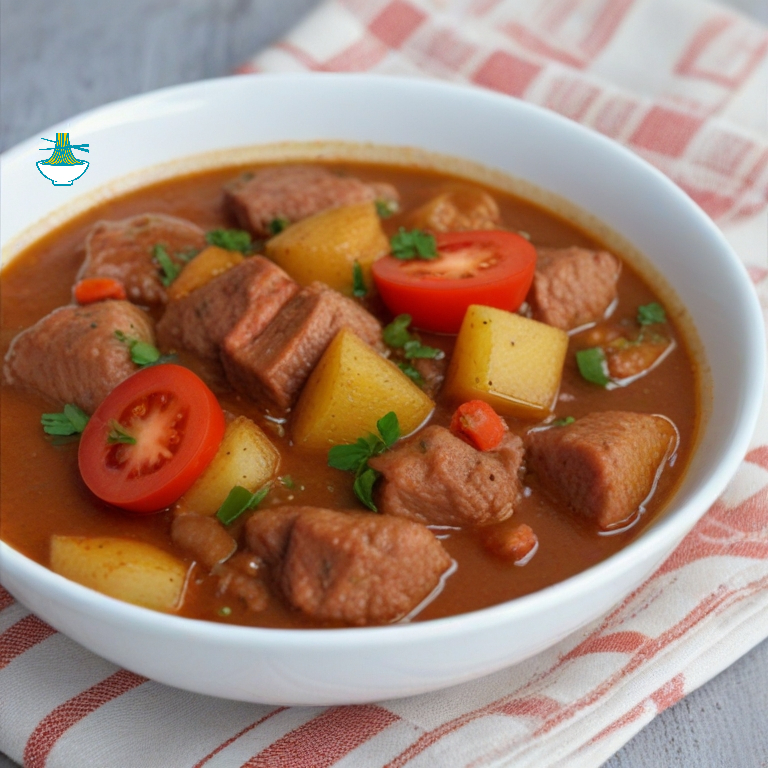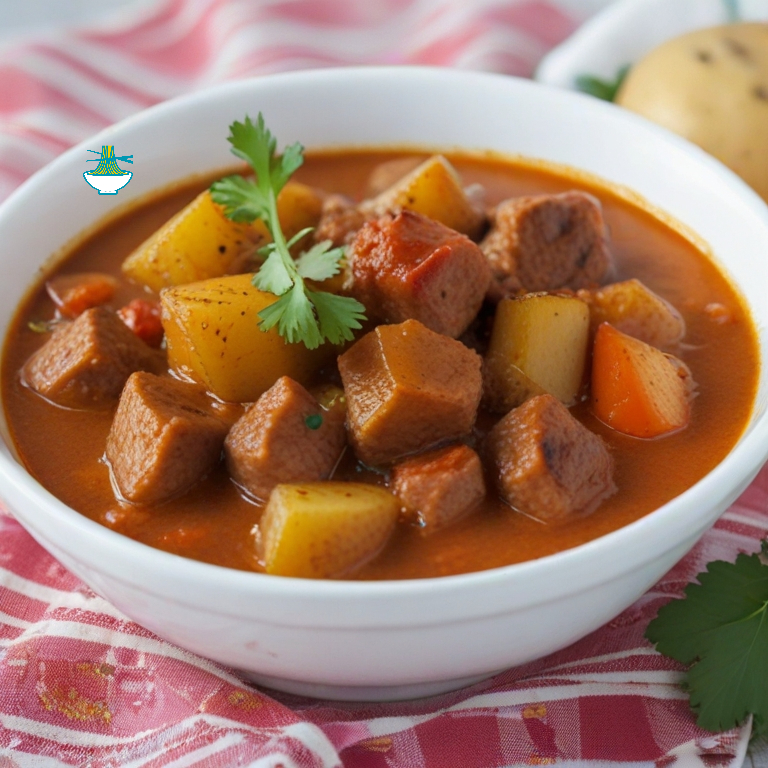Indulge in the rich culinary heritage of Georgia with our tantalizing Georgia Ojakhuri. This traditional Georgian pork stew with potatoes encapsulates the essence of Georgian cuisine, renowned for its bold flavors and comforting warmth. Slow-cooked to perfection, tender chunks of succulent pork mingle with hearty potatoes, bathed in a symphony of aromatic spices and herbs. Each spoonful is a journey through the vibrant landscapes of Georgia, where culinary traditions are steeped in history and hospitality. Whether shared with loved ones or savored solo, this dish promises an unforgettable dining experience that transports you to the heart of the Caucasus. Embark on a gastronomic adventure and discover the irresistible allure of Georgia Ojakhuri today.
Ingredients:
- 1 kg (2.2 lbs) pork shoulder, cut into bite-sized pieces
- 4 large potatoes, peeled and diced
- 1 large onion, finely chopped
- 3 cloves garlic, minced
- 2 tomatoes, diced
- 2 tablespoons tomato paste
- 2 tablespoons vegetable oil
- 1 teaspoon paprika
- 1 teaspoon ground coriander
- 1 teaspoon ground marigold (optional, but adds authentic flavor)
- Salt and pepper to taste
- Fresh parsley or cilantro for garnish
- Water or broth, as needed

Instructions:
1- Heat the vegetable oil in a large pot or Dutch oven over medium heat. Add the chopped onions and sauté until they turn translucent, about 5 minutes.
2- Add the minced garlic to the pot and cook for another minute until fragrant.
3- Add the diced pork pieces to the pot and brown them on all sides, stirring occasionally, for about 8-10 minutes.
4- Once the pork is browned, add the diced tomatoes and tomato paste to the pot. Stir well to combine.
5- Season the mixture with paprika, ground coriander, ground marigold (if using), salt, and pepper. Stir to evenly coat the pork and vegetables with the spices.
6- Add enough water or broth to cover the pork and vegetables. Bring the stew to a simmer, then reduce the heat to low. Cover the pot and let the stew simmer gently for about 1 hour, stirring occasionally.
7- After an hour, add the diced potatoes to the stew. Stir well to incorporate them into the mixture.
8- Continue simmering the stew, covered, for another 30-40 minutes, or until the pork is tender and the potatoes are cooked through. If the stew becomes too thick, you can add more water or broth as needed.
9- Once the pork is tender and the potatoes are cooked, taste the stew and adjust the seasoning with salt and pepper if necessary.
10- Serve the Georgia Ojakhuri hot, garnished with freshly chopped parsley or cilantro. Enjoy this hearty and comforting Georgian dish with crusty bread or alongside a simple salad for a complete meal.
Enjoy your Georgia Ojakhuri, and savor the authentic flavors of Georgian cuisine!
nutritional values :
Pork shoulder (1 kg):
- Calories: 2200 kcal
- Protein: 176 g
- Fat: 160 g
- Carbohydrates: 0 g
- Fiber: 0 g
benefits
- Excellent source of protein, essential for muscle repair and growth.
- Contains essential vitamins and minerals such as B vitamins, zinc, and phosphorus.
Potatoes (4 large):
- Calories: 880 kcal
- Protein: 20 g
- Fat: 0 g
- Carbohydrates: 200 g
- Fiber: 24 g
benefits
- Good source of carbohydrates, providing energy for the body.
- High in fiber, promoting digestive health and satiety.
- Rich in vitamin C, potassium, and B vitamins, supporting immune function and overall health.
Onion (1 large):
- Calories: 60 kcal
- Protein: 2 g
- Fat: 0 g
- Carbohydrates: 14 g
- Fiber: 3 g
benefits
- Contains antioxidants such as flavonoids and quercetin, which may help reduce inflammation and lower the risk of chronic diseases.
- Good source of fiber, promoting digestive health and supporting weight management.
Garlic (3 cloves):
- Calories: 13 kcal
- Protein: 0.6 g
- Fat: 0.1 g
- Carbohydrates: 3 g
- Fiber: 0.2 g
benefits
- Contains allicin, a compound with potent medicinal properties, including antibacterial and antiviral effects.
- May help lower blood pressure and cholesterol levels, reducing the risk of heart disease.
- Contains antioxidants that may boost immune function and protect against oxidative stress.
Tomatoes (2 medium):
- Calories: 44 kcal
- Protein: 2 g
- Fat: 0.4 g
- Carbohydrates: 10 g
- Fiber: 3 g
benefits
- Rich in vitamin C, potassium, and antioxidants such as lycopene, which may help reduce the risk of certain cancers and promote heart health.
- Low in calories and high in water content, making them a hydrating and nutritious addition to meals.
Tomato paste (2 tablespoons):
- Calories: 30 kcal
- Protein: 1 g
- Fat: 0 g
- Carbohydrates: 7 g
- Fiber: 1 g
benefits
- Concentrated source of lycopene and other antioxidants found in tomatoes, offering similar health benefits.
- Adds depth of flavor and richness to dishes without adding excess calories or fat.
Vegetable oil (2 tablespoons):
- Calories: 240 kcal
- Protein: 0 g
- Fat: 28 g
- Carbohydrates: 0 g
- Fiber: 0 g
benefits
- Contains healthy unsaturated fats, including monounsaturated and polyunsaturated fats, which may help improve cholesterol levels and reduce the risk of heart disease.
- Source of vitamin E, an antioxidant that protects cells from damage caused by free radicals.
Paprika (1 teaspoon):
- Calories: 6 kcal
- Protein: 0.3 g
- Fat: 0.3 g
- Carbohydrates: 1.2 g
- Fiber: 0.7 g
benefits
- Contains capsaicin, a compound that may boost metabolism and aid in weight loss.
- Rich in antioxidants such as carotenoids, which may help reduce inflammation and promote eye health.
Ground coriander (1 teaspoon):
- Calories: 5 kcal
- Protein: 0.2 g
- Fat: 0.3 g
- Carbohydrates: 1 g
- Fiber: 0.8 g
benefits
- Source of antioxidants and essential nutrients such as vitamin C, vitamin K, and manganese.
- Contains antimicrobial properties and may help improve digestion and reduce digestive discomfort.
Salt and pepper (to taste): Negligible caloric contribution
Please note that these values are approximate and can vary based on factors such as specific ingredients used, cooking methods, and serving sizes.


Comments